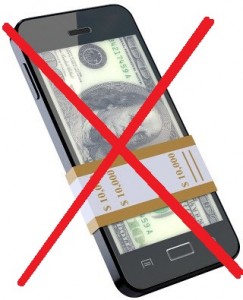Vodafone Turkey is making it possible to simply look at a smartphone for authentication.
The Turkish branch of Vodafone has recently revealed that it will be using EyeVerify technology in order to boost the mobile security of its payments app, allowing customers to open their wallets simply by looking into the camera feature of their smartphones.
iPhone users of the Vodafone Cep Cüzdan mobile wallet app can already register their eyes.
In order to do this, they need only take a picture of their eyes. From that point on, in order to be able to get past the mobile security of their wallet app, they need to take a selfie in which they are looking at the camera. This verification feature is provided by way of the EyeVerify Eyeprint ID tech. That technology is actually able to create map of the unique pattern of veins within the user’s eyes. That is automatically converted into a complex 50 character password.
This mobile security technique takes the image of the individual’s eyes and transforms them into a complicated password.
 The Eyeprint ID takes the image and encrypts and scrambles it locally. For this reason the actual image and information never has to leave the mobile device. This is meant to make the mobile wallet even more secure because it means that it cannot be intercepted, lost, or stolen, says EyeVerify.
The Eyeprint ID takes the image and encrypts and scrambles it locally. For this reason the actual image and information never has to leave the mobile device. This is meant to make the mobile wallet even more secure because it means that it cannot be intercepted, lost, or stolen, says EyeVerify.
The new partnership with Vodafone is the outcome of a new contract that has been established between Olcsan CAD Technology and EyeVerify in Turkey.
Biometrics are becoming an increasingly important part of the mobile payments and wallet experience as a growing number of tech companies choose to add additional verification over the traditional password experience.
The use of fingerprints is becoming more commonplace than ever in order to boost mobile security for a device or a specific app. In this case it is a matter of using the patterns in the eyes of the user instead of focusing on a fingerprint or thumbprint to identify each individual user and block the wrong parties from gaining access. It is more than likely that biometrics will start to appear in an ever broader range of uses as this tech becomes more broadly used for financial purposes.
Android Pay will not charge transaction fees to card providers
Google has announced that it will not be charging transaction fees on mobile payments made through its new Android Pay platform. The move has to do with competing more aggressively with Apple, who has found significant traction in the mobile payments space. Google will not be receiving a percentage of transactions processed from payment cards, such as MasterCard and Visa, which may make Android pay significantly more attractive to merchants interested in the mobile space.
Tokenization may be the death of transaction fees
Google had initially intended to charge a fee on credit card transactions, as this has become the standard for the mobile payments industry, but opted not to. One of the reasons for this is the growing prominence of tokenization, a security practice that replaces financial information with digital tokens. This practice has been adopted and heavily promoted by both MasterCard and Visa as a way to make mobile transactions more secure. One of the issues with tokenization is that it prevents payment services from charging fees to card providers.
Android Pay may become Google’s default mobile payments platform
 In 2011, Google introduced its Wallet platform, which served as the company’s first entry into the mobile payments sector. Google Wallet experienced a relatively rough launch and has struggled to find traction with consumers since. Over the years, Google has been making changes to its approach to the mobile payments market, and the company now plans to launch, making acquisitions to improve its position in the market. In late 2013, Google acquired Softcard, and the company’s technology was used to develop Android Pay.
In 2011, Google introduced its Wallet platform, which served as the company’s first entry into the mobile payments sector. Google Wallet experienced a relatively rough launch and has struggled to find traction with consumers since. Over the years, Google has been making changes to its approach to the mobile payments market, and the company now plans to launch, making acquisitions to improve its position in the market. In late 2013, Google acquired Softcard, and the company’s technology was used to develop Android Pay.
Downfall of transaction fees may bring more merchants into the mobile payments market
Transaction fees have been a significant challenge for retailers and card providers interested in the mobile payments space. While such fees are nothing new in the world of commerce, the mobile sector is still an unproven market, despite the promise that it shows. As such, merchants are somewhat uncertain about entering in the mobile payments space, expressing concern that this sector may be little more than a passing fancy for most consumers.
 The Eyeprint ID takes the image and encrypts and scrambles it locally. For this reason the actual image and information never has to leave the mobile device. This is meant to make the mobile wallet even more secure because it means that it cannot be intercepted, lost, or stolen, says EyeVerify.
The Eyeprint ID takes the image and encrypts and scrambles it locally. For this reason the actual image and information never has to leave the mobile device. This is meant to make the mobile wallet even more secure because it means that it cannot be intercepted, lost, or stolen, says EyeVerify.
 In 2011, Google introduced its Wallet platform, which served as the company’s first entry into the mobile payments sector.
In 2011, Google introduced its Wallet platform, which served as the company’s first entry into the mobile payments sector. 